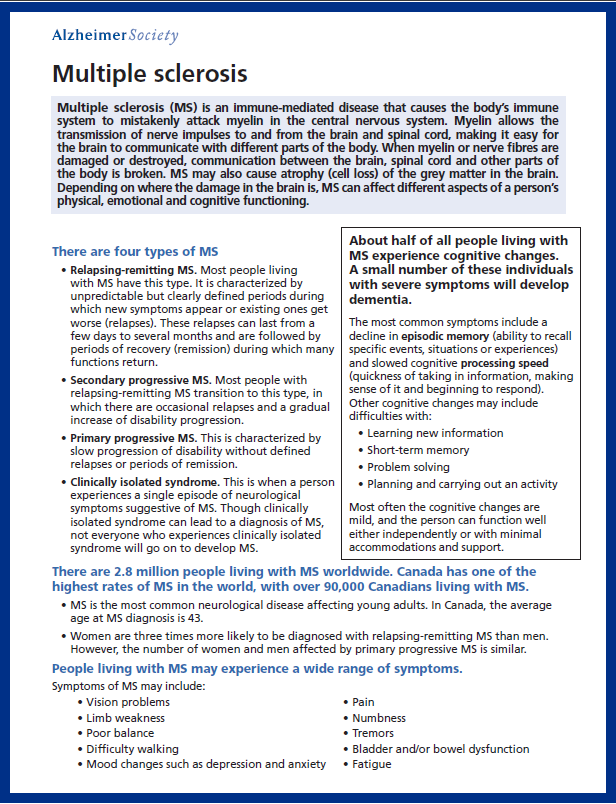Multiple sclerosis
Multiple sclerosis is an unpredictable inflammatory disease that damages the central nervous system – including the brain. This damage can cause a wide variety of physical and cognitive symptoms.

Overview
Multiple sclerosis (often shortened to MS) is an unpredictable autoimmune disease that causes damage to the central nervous system (which includes the brain, spinal cord and optic nerve).
This damage can cause interrupted or inaccurate communication between the central nervous system and other parts of the body, resulting in a wide variety of physical and cognitive symptoms.
Read our print-friendly, downloadable brochure on multiple sclerosis in PDF.

Types
MS is divided into categories, depending on the pattern of the individual’s disease.
Relapsing remitting MS
Approximately 85% of people are diagnosed with relapsing remitting MS (RRMS), characterized by unpredictable but clearly defined periods during which symptoms are apparent (hence the term ‘relapse’). Relapses can last for varying periods (from a few days to several months) and are followed by periods of recovery (referred to as remission) during which many functions return.
With time, about half of those people with RRMS may evolve into a secondary progressive phase of the disease. In this phase, relapses and remissions no longer occur, but there is a gradual worsening of the person’s physical disability.
Primary progressive MS
Individuals who accumulate disability and experience worsening of symptoms right from the start are diagnosed with primary progressive MS.
Symptoms
People with MS may experience a wide range of symptoms throughout the course of the disease.
General symptoms
Symptoms of MS can include:
- Visual loss,
- Limb weakness,
- Poor balance,
- Difficulty walking, and
- Chronic pain.
Changes in cognitive abilities
About half of all people living with MS experience cognitive dysfunction. People with cognitive dysfunction typically experience difficulties with:
- Short-term memory,
- Information processing speed,
- Problem-solving,
- Recalling words, and
- Planning and carrying out activities.
Visual spatial disorientation
Visual spatial disorientation can be seen as a symptom of MS. If you're finding it difficult to "sense" yourself relative to the earth, your surroundings and objects around you, you may be experiencing spatial disorientation.
For example, you might see an object near you and perceive it to be located closer or farther to you than where it actually is. Think of the effect when you look at a passenger side mirror in a car, where "objects may be closer than they appear" – this is a mild way of experiencing visual spatial disorientation.
Other symptoms
Other symptoms of MS may include bowel dysfunction, fatigue, numbness, tremors and depression.
Diagnosis
Diagnosing MS can be challenging as there is no single test to make the diagnosis. The diagnosis of MS is made once other potential causes have been ruled out.
Medical history and exams
Your doctor will assess patterns and types of symptoms along with a complete medical history and neurological examination to help make the diagnosis.
Brain imaging
MS is an unpredictable autoimmune disease that causes damage to the central nervous system (brain, spinal cord and optic nerve). Brain imaging (commonly known as MRI) is often used to detect any damage to the brain and spinal cord.
Evidence of disease activity
A diagnosis of MS must include evidence of disease activity separated in time (typically consisting of lesions that formed at different points in time) and space (lesions in at least two separate areas of the central nervous system).
Special tests
Special tests may help to identify any abnormalities in the brain that are associated with MS.
Spinal tap
A spinal tap (lumbar puncture) may help to identify the presence of a specific protein found in the cerebrospinal fluid known to be present in MS. A spinal tap can also help to rule out other conditions.
Evoked potential test
An evoked potential test may be used to assess the rate of electrical impulses produced in a person’s nervous system in response to stimuli.
Risk factors
While the exact cause of MS is not known, current research increasingly points to a complex interplay of environmental and possibly genetic risk factors. These factors may influence a risk for developing MS given a prescribed set of conditions which are yet to be discovered.
Researchers are investigating whether certain risk factors impact a person’s susceptibility to MS, such as:
- Gender and sex,
- Age,
- Family history, or
- Lifestyle habits.
Treatment
Currently, there is no known cure for MS.
Different medications are used to help slow the progression of the disease, reduce relapses, decrease the severity of the attacks and to manage some of the symptoms of MS.
Therapeutic approaches
Therapeutic approaches also support people living with MS to effectively manage symptoms of their disease:
- Physical therapy and rehabilitation can maintain or improve physical functioning throughout the progression of the disease.
- Treatment may also be focused on promoting healthy lifestyles through proper nutrition, exercise, self-care and rest.
More information and resources
The MS Society. The MS Society is Canada's leading nonprofit organization dedicated to providing services to people living with multiple sclerosis and their families, as well as funding research to find the cause and cure for multiple sclerosis.
